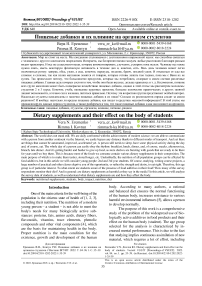Dietary supplements and their effect on the body of students
Автор: Eremenko V.N., Kovtun R.I.
Журнал: Вестник Воронежского государственного университета инженерных технологий @vestnik-vsuet
Рубрика: Пищевая биотехнология
Статья в выпуске: 1 (91), 2022 года.
Бесплатный доступ
The world does not stand still. We are daily confronted with the achievements of modern science: we are able to communicate with a person from another continent via the Internet, we easily bypass any distance thanks to different modes of transport. And yet there are things that cannot be automated, improved, accelerated yet. A person still needs to sleep, have some physical activity during the day and, of course, eat. The whole day of a person can easily obey the rhythm: breakfast, lunch, dinner, and, of course, snacks, afternoon tea, brunch, late dinner. And it's getting harder and harder to give up food, as store shelves are bursting with goods that are ready to lie there for years until we buy them. This is because most of the foods we consume contain various dietary supplements in their composition. The main purpose of which is to make them tastier, stored longer, etc. Undoubtedly, the nutrition of all population groups can be affected by food additives, but in this article we will consider young people: 2nd and 3rd year students. Of course, studying, writing course projects, a large number of practical and other classes deprive you of the opportunity, or rather the strength and desire, to eat right. Therefore, this age group is of particular interest. To what extent are students aware of the presence of food additives in their food? How many of the survey respondents monitor their diet? And in general: are dietary supplements as harmful as they say in the media? In this article, we will analyze the survey data of students, as well as understand what dietary supplements are and how they affect the body.
Nutritional supplements, students, body, impact, nutrition, diet
Короткий адрес: https://sciup.org/140293781
IDR: 140293781
Список литературы Dietary supplements and their effect on the body of students
- Ivanova N.G., Sinelnikova N.A. The solution of some problems in the process of achieving high results in sports through the use of biomedical technologies. Scientific notes of the P.F. Lesgaft University. 2018. no. 9. pp. 129-133.
- Ivanova N.G., Khrebtiiv V.N. Vision security standard of living and its impact on mental and physical health of the younger generation. Baltic humanitarian journal. 2020. vol. 9. no. 3. pp. 88-90.
- Eremenko V.N., Grinchenko V.S., Tsaava S.V., Pitkin V.A. et al. Optimization of food recipes for people of mental work and their lifestyle. IOP Conference Series: Earth and Environmental Science. IOP Publishing, 2021. vol. 659. no. 1. pp. 012136.
- Maughan R.J., Burke L.M., Dvorak J., Larson-Meyer D.E. et al. IOC consensus statement: dietary supplements and the high-performance athlete. International journal of sport nutrition and exercise metabolism.2018. vol. 28. no. 2. pp. 104-125. doi: 10.1123/ijsnem.2018-0020
- Eremenko V.N., Lytkin A.V., Sinko O.V., Tyupenkova G.E. et al. Physiology of digestion and the basics of rational nutrition. Proceedings of VSUET. 2019. pp.159-165.
- Nechaev A.P., Traubenberg S.E., Kochetkova A.A. et al. Food chemistry. St. Petersburg, GIORD, 2015. 672 p.
- Eremenko V.N., Levchenko A.A. The influence of physical exercises on the mental performance of students. Physical culture and sport in higher educational institutions: topical issues of theory and practice : a collection of articles based on the materials of the national scientific and practical conference dedicated to the 70th anniversary of the formation of the Department of Physical Education of the Kuban State University, Krasnodar, October 28-29, 2020. Krasnodar, Kuban State Agrarian University named after I.T. Trubilin, 2020. pp. 507-512.
- Eremenko V.N., Medvedeva A.S., Levchenko A.A. The role of physical culture in human life. Azimut of scientific research: pedagogy and psychology. 2019. vol. 8. no. 3(28). pp. 353-355. doi: 10.26140/anip-2019-0803-0091
- Shaulina L.P., Korsun L.N. Quality and safety control of food products and food raw materials: studies. manual. Irkutsk, Publishing House: IGU, 2011. pp. 63.
- Eremenko V.N., Sinko O.V., Fedorova N.P. The role of physical education in the life of youth. E-Scio. 2019. no. 6(33). pp. 303-310.
- Ivanova N.G., Sinelnikova N.A. The solution of some problems in the process of achieving high results in sports through the use of biomedical technologies. Scientific notes of the P.F. Lesgaft University. 2018. no. 9. pp. 129-133.
- Ivanova N.G., Khrebtiiv V.N. Vision security standard of living and its impact on mental and physical health of the younger generation. Baltic humanitarian journal. 2020. vol. 9. no. 3. pp. 88-90.
- Eremenko V.N., Grinchenko V.S., Tsaava S.V., Pitkin V.A. et al. Optimization of food recipes for people of intellectual labor and their lifestyle. International Conference on Engineering Research and Cooperation in Global Agricultural Production. 2020. pp. 140.
- Maughan R.J., Greenhaff P.L., Hespel P. Dietary supplements for athletes: emerging trends and recurring themes. Food, Nutrition and Sports Performance III. 2013. pp. 65-74.
- Bucci L.R. Dietary supplements as ergogenic aids. Nutrition in exercise and sport. CRC Press, 2022. pp. 315-368.
- Navarro V.J., Barnhart H., Bonkovsky H.L., Davern T. et al. Liver injury from herbals and dietary supplements in the US Drug-Induced Liver Injury Network. Hepatology. 2014. vol. 60. no. 4. pp. 1399-1408. doi: 10.1002/hep.27317
- Bagchi D. Nutraceutical and functional food regulations in the United States and around the world. Elsevier, 2014.
- Kerksick C.M., Wilborn C.D., Roberts M.D., Smith-Ryan A. et al. ISSN exercise & sports nutrition review update: research & recommendations. Journal of the International Society of Sports Nutrition. 2018. vol. 15. no. 1. pp. 1-57. doi: 10.1186/s12970-018-0242-y
- Santana-Galvez J., Cisneros-Zevallos L., Jacobo-Velazquez D.A. Chlorogenic acid: Recent advances on its dual role as a food additive and a nutraceutical against metabolic syndrome. Molecules. 2017. vol. 22. no. 3. pp. 358. doi: 10.3390/molecules22030358
- Amiot M.J., Riva C., Vinet A. Effects of dietary polyphenols on metabolic syndrome features in humans: a systematic review. Obesity reviews. 2016. vol. 17. no. 7. pp. 573-586. doi: 10.1111/obr.12409


